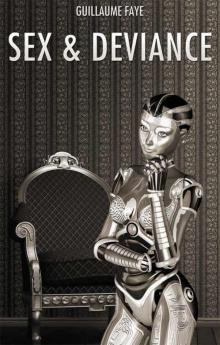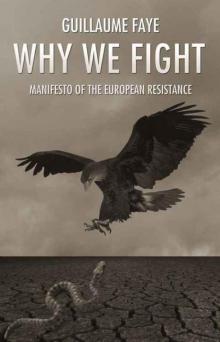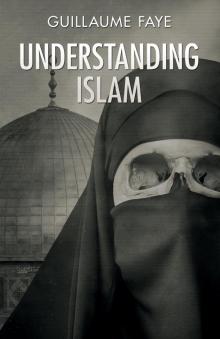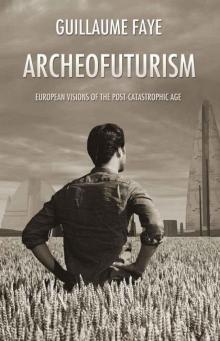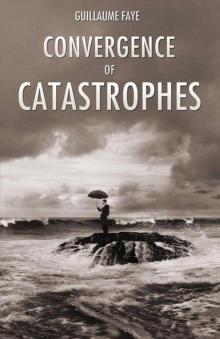Sex and Deviance, page 2




[7] The development of an aspect of a species through evolution.–Ed.
[8] Contrary to egalitarianism, including its differentialist or ethnopluralist version (pseudo-inegalitarianism), my claims rest upon the observation of inequality of level and value among the branches of humanity and civilisations. I start from the observation that there exist degrees of civilisational evolution tied causally to collective heredity. I consider the intellectual pedantry which transforms the ideas of level and value into mere difference to be an egalitarian fraud, plain and simple. But contrary to the Left-wing French Republican egalitarians of the nineteenth century (Jules Ferry, etc.) who launched colonialism, I do not think there are (culturally) ‘inferior races’ which the superior races must lead to a high state of civilisation. This is simply because neither inferior nor superior races exist in the sense they intended; rather, there are levels of culture and civilisation that depend on the genetic endowment of the people who are their vehicles. It is impossible that a population X should raise itself to the level of a population Y, unless they are genetically similar — as occurred with the Celts and Germanic peoples in the Roman Empire. For that matter, a still emerging race or civilisation can evolve or devolve. In counterpoint with this fundamental and inherited inequality, populations which can serve as vehicles for the creation of superior civilisations are more fragile than other populations.
[9] Arnold Gehlen (1904–1976) was a German philosophical anthropologist who emphasised the ‘unfinished’ character of human nature and its need for completion by cultural norms. He was the author of Man: His Nature and Place in the World (New York: Columbia University Press, 1988).–Tr.
[10] Konrad Lorenz (1903–1989) was a famous Austrian researcher of animal behaviour and co-founder of the discipline of ethology. He won the Nobel Laureate in Physiology in 1973.–Tr.
[11] Before European colonialism, the African continent was very thinly populated, with its high birth rate balanced by high mortality. The demographic explosion of Africa resulted from a massive decrease in the mortality rate (while maintaining or only slightly lowering the birth rate) due to the arrival of European medicine and hygiene. Europeans acted this way for moral reasons (Christian charity in its original or secularised version), as well as in their own interest (to have a healthy workforce). But that does not change the fact that the demographic explosion of Africa (including the former Ottoman possessions in the north) is due to European colonialism, which was a benefit for those colonised but, over the long term, harmful to the former colonisers.
[12] Contrary to the originally Christian concept of the equal intrinsic quality and essential nature of all men, from which derives the moral imperative of equal respect due each of them (Kant), I prefer to follow the common-sense view of Aristotle who allows for a hierarchy of natural qualities between individuals as well as ‘cities’ , i.e., between peoples. An unthinkable position today, but who reads Aristotle anymore?
[13] Regarding sexual behaviour as well as other domains, it is not so much religions or ideologies which influence morals as the inborn morals of nations that imprint and express themselves in their ideologies and religion. Thus, the inferiority of women in Islam is not properly Islamic, but emerged before that ideology/religion, and is tied to the populations which created Islam. I will be reproached with determinism and biological reductionism. This is partly true, but only partly: for retroactive effects can be observed thanks to the plasticity of the human brain. A population influenced by an ideology/religion created by another civilisation will modify its morals, but not completely; it will apply the ideology/religion according to its own genetic dispositions.
[14] Roughly, active versus passive nature. The distinction goes back to Spinoza. –Tr.
[15] There was no ‘colonisation’ by Europeans in Africa and Asia except in the cases of Algeria and South Africa, and even these were not massive. It is better to speak of colonialism. On the other hand, the principal European colonisation took place on the American continent from the sixteenth and seventeenth centuries. But the real demographic colonisation which history will remember is the present colonisation of Europe by Afro-Asiatic, mostly Muslim, populations.
[16] René Thom (1923–2002) was a French mathematician and founder of catastrophe theory, is the idea that tiny changes in the parameters of a dynamic system can cause large and sudden changes in the behaviour of the system as a whole. Thom was awarded the Fields Medal in 1958. Primogine is his Belgian disciple. –Tr.
Chapter 1
Funeral Dirge for the Family
The fertile and long-lasting heterosexual family unit is in steep decline among Europeans, which explains the dramatic drop in their birth rates. This decline has many secondary causes, but they all lead back to a single primary cause: the excessive individualism associated with egalitarianism. Paradoxically, the origin of this individualism lies in Christianity.
Nothing really opposes the traditional heterosexual family, but everything is discouraging it, starting with the general ideological character of our time.
In my view, the ultimate cause of the slow decline of the couple and the traditional family lies not with the ideology of the conservative Right, which is bound up with the Enlightenment and the triumph of individualism, consumerism, feminism, and so on. These aspects are pertinent, but they are secondary causes.
The principal reason for the decline of the enduring, fertile family, as of the stable heterosexual couple, is the conflation of conjugality with sexual love, or ‘marriage for love’.
This is a conflation on three levels: lineage, sex, and love. It is a distant and paradoxical consequence of the Christian vision of marriage and sex. I say this with all due moderation and caution that, paradoxically, bourgeois marriage (which was the outcome of Christian love) was able to reach a point of equilibrium. But it has gone past this point. In a world of perpetual becoming,[1] there is never any lasting equilibrium; all is subject to reconstruction, all is subject to readjustment.
The Disappearance of the Lasting Couple
It might be asked whether an overly refined sexuality (marked, let us say, by ‘sensuality’, or erotic individualism) is not incompatible with the traditional large family. The erotomaniac is not identified with the image of the family father, nor the ‘liberated woman’ with that of the family mother. Sexual austerity seems to be the condition in the West for stable couples with numerous children, just as the inevitable and necessarily hypocritical separation between (open) conjugal sexuality and (dissimulated) libidinal sexuality is a paradoxical condition for the stable, fertile couple. Deceiving one’s spouse is not a case of simply having discreet sexual adventures, but of having a stable, permanent lover; that is, breaking the conjugal (and familial) pact, which is not simply a matter of sex, and may not even include sex.
On the other hand, the problem can be approached from different directions: a society cannot reproduce itself in the long term if there is a confusion and equivalence of roles between man and woman. The stable, fertile couple presupposes recognition of the radical differentiation between the genders, which is completely contrary to the current prevailing ideology (see the critique of Gender Theory, below).
* * *
The ideology of love, obviously of Christian origin, has done considerable harm not only on the political level (as we shall see later on), but also at the level of the family. Firstly marriage for love, then amorous concubinage, have been the grave of the family and of the stable couple, by a very complex sociological process.
Since the 1960s, an explosion in the rate of divorce, the number of single-parent families, the spectacular growth in the number of bachelors, the social isolation of the elderly, the educational deficiencies, and so on, have all marked the collapse of the traditional family in the West.
Sociologists speak of an explosion of ‘happy divorces’. The rate of divorce by mutual consent or joint request is exploding.[2] One often sees a father, his ex-wife and the new stepfather going on vacation or getting along (superficially, in fact) with the children of the first as well as of the second marriage. In the schools, the number of children who are part of a permanent and stable traditional family with parents who have never divorced is becoming a minority. Two newly divorced spouses form a family reconstituted from the children of both. President Sarkozy’s family, before his second divorce and third marriage, set the example at the very moment of his election as head of state.
The 2004 Act, by drastically simplifying that of 1975 on divorce by mutual consent, in fact instituted divorce by repudiation — an undertaking which is viable even without the consent of one’s spouse. This means that it is not civil unions which have been elevated to the rank of marriage, but marriage which has been lowered to the rank of a civil union. Moreover, a majority of deputies on the Right in 2010 rejected a proposed amendment aiming to make marriage fiscally more advantageous than civil unions. In fact, we are witnessing the suppression of marriage as the institution which prevailed, broadly speaking, among all social classes for several centuries.
As the sociologist Jean-Claude Le Goff writes:
In the 1950s and 1960s, institutions like marriage carried more weight, as well as both an affective and institutional dimension. Keeping a mistress was tolerated, but divorce strongly disapproved of. Since the 1970s, the institutional dimension of marriage has been steadily disappearing. Couples find the divorce procedure far easier on the social level, but the drama, experienced in a more private way, is intensified and sometimes becomes even more difficult to live through. Part of the current of the times is not showing that one is affected by it. Our society refuses to recognise what is tragic. But the psyche is subject to influence, and this cannot wilfully be prevented. Feelings leave their traces in the unconscious, and it is not always good to bury them.[3]
Couples, increasingly immature and afflicted by extended adolescence, separate at the first storm and as soon as the phase of infatuation ends. This is very harmful for the mental development of children particularly when the family unit undergoes reconstitution), since it disconnects the ideas of conjugality and parenthood.
Previously, people stayed together and overcame their difficulties as a couple because of the children and out of faithfulness to the family lineage, committing to raising children together in a wholesome and stable environment. Today, self-interested individualism is rampant and couples break up in spite of the children. Despite all the treacly talk about compassion and protection, children, mere luxury playthings, are no longer prioritised.
In the midst of these deformed families, the psychological development — indeed, the intellectual capacities — of children and adolescents are necessarily hugely disturbed. This is a real step backwards from the European family model. Blood ties are broken. Insofar as the family is a microcosm of the nation (the cell to its body, guaranteeing its homogeneity), the he loss of the very concept of family lineage and that of family tradition and inheritance (in both the biological and social senses) is one of the root causes of the loss of ethnic and racial conscience, as well as indifference to miscegenation and colonisation by mass immigration.
Fragility of Unions Based on Romantic Love
Love is one of the most indeterminate words there are: it signifies too many things to be precisely defined. Its semantic field resembles what mathematicians call a fuzzy set. Passionate love, attachment, attraction, desire, conjugal love, filial love, divine and religious love, and even friendship all belong to the amorphous set of ‘love’. The term’s complexity mirrors the complexity of human psychology. Furthermore, we must understand that the concept we have of ‘love’ is not understood in the same sense by different peoples, civilisations, and eras. Indeed, the very word is untranslatable in many languages.
In Western societies today, the sexualisation of love has drastically weakened the couple; their love is built on passion of a sexual nature, which is an intense but fleeting feeling, fragile and ephemeral, and infected with egoism. The marital union is, today, hastily entered into out of adolescent immaturity. Establishing a family and a lineage becomes secondary in relation to the ‘presentism’ inherent in intense desire; the urge ‘to live with her or him whom I love and desire, right away’. Superficial considerations prevail at the expense of forethought as well as of genuine understanding of one another. As a result, many marriages end in failure — a situation made all the more serious if children are involved, hence the complications arising from ‘reconstituted families’. The phony ‘love’ or infatuation of the early days inevitably disappears and the two individuals are torn apart. This matter is well exemplified by mixed (intercultural or interethnic) marriages, incomparably more difficult to manage than the interclass marriages of earlier times. When two individuals, alien to one another in every way and who only know each other superficially, are compelled to form an instantaneous union, the result is almost immediate drama and break-up.
Obviously, there can be no question of returning to the arranged marriages of former days, founded on a purely familial strategy and with total disregard for the woman’s wishes.[4] Such a return, however, is (paradoxically!) just what is happening at this moment. Because of mass immigration, Islamic culture is spreading arranged marriage across Europe, with the absolute submission of the wife who is forced into it. And this archaic, totally communal form of marriage is coexisting with the romantic, presentist and individualist love of the Western type: an explosive mixture of kinds! The problem is that the first form gives rise to demographic growth while the second results in a deficit of births.
The Western model of romantic love, a union of two egos, undermines any family strategy and leads mechanistically to a low birth rate, which is one of the explanations of the demographic deficit among fragile Europeans Ideally, one would like to find a golden mean between an egalitarian union of a man and a woman based on an emotional-sexual attraction (though not absolutely based on this, and only in a way which can be surpassed) and desires for marriage founded on considerations of character, culture, family, and ethnicity. Such an equilibrium was found in the bourgeois family of which I shall speak later. Under this model, divorce was much more serious and dishonourable than adultery.[5] Though lampooned by ignorant snobs, it was a model of balance that functioned well for over two centuries.
The immature emotional-sexual romantic union is an obstacle to reproduction and to family strategising, because it favours the short term and the mood of the moment. The couple lives from day-to-day under a sort of variable term contract, like two speculators in a futures market. As soon as the emotional-sexual attraction of ‘love’ ceases, often when the smallest difficulties arise, the couple breaks up, since it was founded only on irresponsible egoism disguised as ‘love’. Obviously, the consequences for family reproduction and the upbringing of children are catastrophic. The balance that the bourgeois family was able to find — between the emotional attraction between a man and a woman and a rational and strategic agreement based on cultural proximity — has been broken. ‘Lovers who marry’ do so in an infantile fashion without any plan, only compelled to do so by their idolisation of their Love. The imperative runs: Marry whomever you want for as long as you’re in love — without calculation, without a strategy, without prejudices, without worrying about differences or about the future. What is little recognised is that this imperative, with all its perverse ramifications, is a consequence of the Christian mentality.
This sort of prescription can obviously result in aberrant unions which almost always end badly, as in the case of interethnic marriages. To criticise such marriages is today considered diabolically subversive and sinful. In this regard, I can only approve of the good sense of some Jewish authorities who encourage inter-Jewish marriages, just as Catholics and Protestants used to be encouraged to marry amongst themselves.[6] Even if it ought to be present at the beginning as cement — but not as a foundation stone — amorous sentiment is insufficient for the commitment marriage demands. Marriage is a construction built to last, not a stage decoration. As for romantic sentiment, it must be completed with this imperative prescription: Do not marry a foreigner. ‘Foreigner’ here is to be understood not in its strictly national sense (for example between people of European origin) but in its civilisational, ethnic, cultural, religious, and (obviously) racial sense — although this last term is all the more forbidden as the reality it names becomes increasingly prevalent.
* * *
A question then arises: that of sexual fidelity. Is lasting, fertile marriage compatible with the physiological need for sexual variation, especially on the part of the male? Erotic sexuality is quite disconnected from its affects. This is a complex subject, all the more difficult in that human sexuality is polymorphous. There are two possible answers to this problem. The first is that the conjugal bond should not be principally based on eroticism (although it may include it) and that it should survive sexual betrayals for the sake of a superior imperative: the stability of the family and of the lineage. The second answer lies in the necessary hypocrisy of prostitution, or discreet, ephemeral liaisons; hence the need to authorise and regulate prostitution, tactfully and discretely. A well-organised system of prostitution is the best protection for families. By this I mean that sexual fidelity is quite secondary to conjugal and familial fidelity.
Today, for example, it is common for couples to separate when the wife discovers that her husband consorts with prostitutes or temporary mistresses. This proves that the union was not based on the formation and/or perpetuation of a family, but on a passing emotional-sexual impulse.

